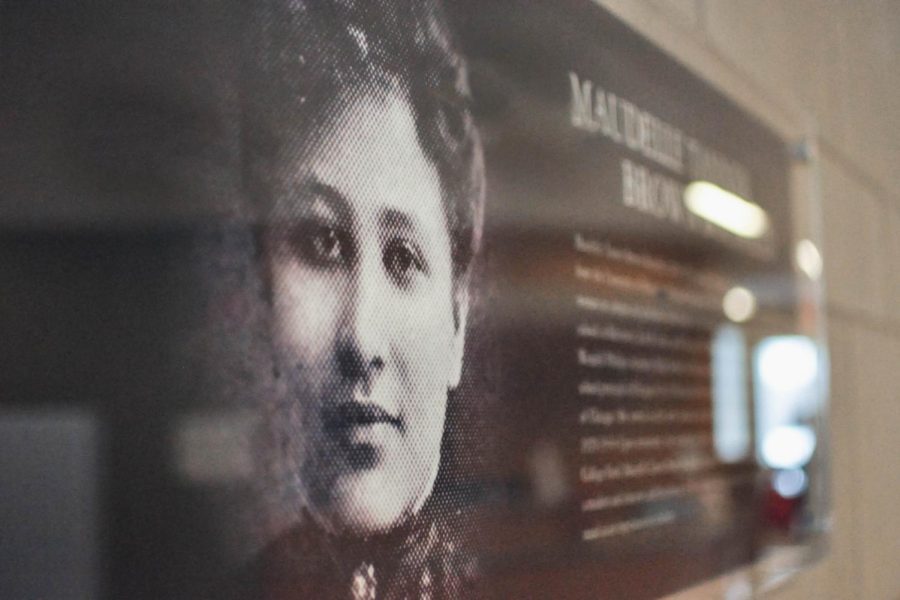Residence hall honors Maudelle Tanner Brown Bousfield
A plaque of Maudelle Tanner Brown Bousfield is located by the entrance of Bousfield hall. The hall was named after her in dedication for being the first Black woman to graduate from the University.
Feb 16, 2022
When Ashleigh Kendrick, sophomore in Media, moved into Bousfield Hall, she was surprised and happy to learn that the building was named after Maudelle Tanner Brown Bousfield.
“When I found out, I was very excited,” Kendrick said. “I called my mom and my dad, and told them that the dorm hall I’m staying in is named after the first Black woman to graduate from the University of Illinois.”
In 1906, Bousfield became the first Black woman to graduate from the University. She earned degrees in both astronomy and mathematics, graduating with honors. In 2013, the University opened Bousfield Hall and chose Bousfield as the namesake to commemorate her legacy and impact.
“To see a dorm hall named and dedicated to someone of your own demographic, it feels like the University sees us,” Kendrick said. “It knows its students’ history and it’s paying attention to us, and it cares about us.”
Jameatris Rimkus, archivist for reference and user engagement, praised the University for its recognition of Bousfield.
Get The Daily Illini in your inbox!
“I also believe that her impact can still be felt on this campus,” Rimkus said in an email. “The naming of a residential hall in her honor is an example of the University working to ensure her legacy and impact lives on.”
Chanel Ziegler, sophomore in LAS, said she felt inspired by Bousfield and her accomplishments.
“It’s very inspiring, as a Black woman myself, seeing how far she could go, especially in a time where she didn’t have that many rights,” Ziegler said. “And she was still able to have a lot of success in her life.”
Jada Powell, sophomore in LAS, said Bousfield’s impact is still felt at the University.
“Her legacy represents the strength that Black women have, I think it represents our resilience,” Powell said. “It shows strength, and it makes other people, especially Black girls, feel like if she could do it, then we can, too.”
Kendrick said Bousfield’s achievements empower Black women.
“I think it represents the excellency of Black women,” Kendrick said. “We often talk about Black excellency in the Black community, but sometimes I feel that Black women get forgotten about.”
Furthermore, according to Rimkus, Bousfield’s impact didn’t end after her graduation.
“She taught high school math in Baltimore, east St. Louis and Chicago,” Rimkus said. “Her career continued and she was the first to (do) many things.”
Rimkus also said that Bousfield became the first Black public school principal in Chicago.
Ziegler said that she believes Bousfield’s graduation from the University set the stage for the future success of students from all backgrounds.
“Her being at the University definitely opened doors for more people in the future,” Ziegler said. “Someone always has to be the first to step through the door so that other people can follow.”
Powell said she believes Bousfield showed the University what Black women are capable of.
“She proved a point to the University,” Powell said. “It shows that we are here; Black women are here.”
Despite living in Bousfield Hall, Kendrick, Powell and Ziegler all said they knew very little about Maudelle Bousfield. They explained that they only learned about her after moving in.
“I had no idea I was staying in a dorm named after a Black woman until I read the little plaque outside of the hall,” Powell said. “I think other people, probably most people in this building don’t even know who it’s named after.”
Powell further explained that she believes the University should do more to educate students about Bousfield and her legacy. Kendrick and Ziegler echoed this.
Kendrick said she thinks the University is doing a good job at representing students from diverse backgrounds but that there is still more to be done.
“I feel like the University does try its best to educate students about diversity,” Kendrick said. “They’re pretty woke. They don’t tolerate racism.”
Ziegler shared similar thoughts. She said more change still needs to happen.
“There’s always more changes to be made, it could be better,” Ziegler said. “I think they’re recognizing that there are some issues they have to address, but I think there’s always more to do.”






